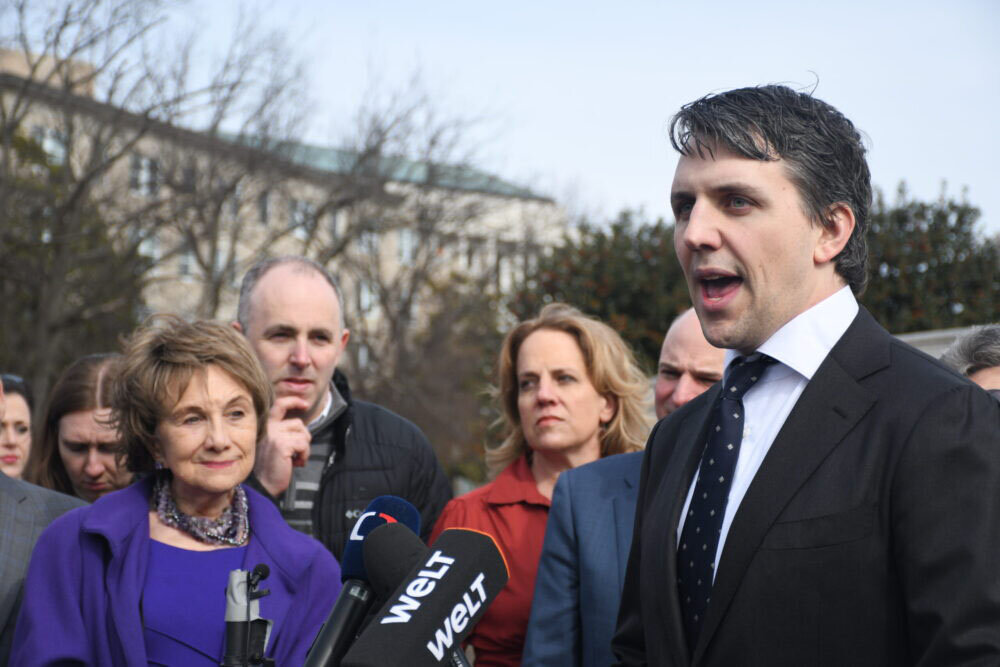Supreme Court appears skeptical of Colo.’s effort to ban Trump from ballot
U.S. Supreme Court justices were skeptical of Colorado’s decision to remove former President Donald Trump from the Republican primary ballot during Thursday’s oral arguments.

You must be a member to read this story.
Join our family of readers for as little as $5 per month and support local, unbiased journalism.
Already a member? Log in to continue. Otherwise, follow the link below to join.
Please log in to continue |
Supreme Court appears skeptical of Colo.’s effort to ban Trump from ballot
WASHINGTON — Supreme Court justices were skeptical of Colorado’s decision to remove former President Donald Trump from the Republican primary ballot during Thursday’s oral arguments.
The Colorado Supreme Court on Dec. 19 ruled that Trump is disqualified from holding office due to his involvement in the Jan. 6 insurrection, citing Section 3 of the 14th Amendment of the Constitution, barring from office those who participate in an insurrection. If the Supreme Court upholds that decision, more states could ban Trump’s name from their ballots.
But justices nominated by both Republican and Democratic presidents questioned whether a state should have the power to so significantly affect the presidential race.
“The question that you have to confront is why a single state should decide who gets to be president of the United States,” Justice Elena Kagan said. “Why should a single state have the ability to make this determination, not only for their own citizens but for the rest of the nation?”
Justice Samuel Alito expressed concern that other states could “retaliate” and exclude other candidates from the ballot.
In addition, Chief Justice John Roberts said, “I would expect that, you know, a goodly number of states will say, ‘Whoever the Democratic candidate is, you’re off the ballot.’”
And Justice Amy Coney Barrett said striking a national candidate from a ballot “doesn’t seem like a state call.”
Legal experts and public commentators seemed to agree that the Supreme Court will very likely reverse Colorado’s ruling.
“The justices appear poised to kick the can down the road by prohibiting states from disqualifying Donald Trump,” said Mark Graber, law professor at the University of Maryland, “but leaving open the possibility that Congress could disqualify or pass legislation authorizing states to disqualify.” Graber supported Trump’s disqualification in an amicus curiae brief to the Supreme Court.
Jason Murray, the attorney representing the Colorado voters who challenged Trump’s name on the ballot, warned that the justices said that, if the court sides with the former president, that case would be done but “could come back with a vengeance.” Congress would have to determine whether Trump is disqualified from office if he wins the November election, he added.
Whether Trump did participate in an insurrection Jan. 6, 2021, was barely discussed in the hearing. Instead, Trump’s lawyer, Jonathan Mitchell, argued that states can’t bar insurrectionists from running for president anyway.
When Justice Ketanji Brown Jackson asked Mitchell about it, he said that “we never accepted or conceded ... that this was an insurrection,” arguing that there needs to be an organized, concerted effort to overthrow the government through violence.
“So, your point is that a chaotic effort to overthrow the government is not an insurrection?” Jackson replied, causing a wave of laughter in the courtroom.
“None of the criteria were met. This was a riot. It was not an insurrection,” Mitchell insisted.
The Constitution says that a person cannot hold office after engaging in an insurrection if that person previously has taken an oath to support the Constitution of the United States. Congress, however, can vote to remove the restriction by a vote of two-thirds of each house.
In the oral arguments, the parties argued whether presidents are covered by this section and, more specifically, if Trump is. Since he never held any other office, his lawyer Mitchell argued that he might “fall through the cracks,” however “odd” it seems.
Michael Spivey, a senior lecturer who teaches constitutional law at the University of Maryland, said that the court might decide on legal technicalities without addressing the core issue of Trump’s involvement in Jan. 6.
“You probably won’t have people marching in the streets if you have that decision,” Spivey said.
In response, Trump said, “I’m a believer in our country, and I’m a believer in the Supreme Court,” in a video published shortly after the hearing.
“President Trump disqualified himself from holding office,” Murray told reporters outside the court after the arguments had concluded, referring to Jan. 6. “That’s not something we’re doing to him. That’s not something any court is doing to him. That is something he did to himself under our Constitution.”
The Supreme Court is expected to issue a decision before Super Tuesday — March 5 — when Colorado and 14 other states vote. Trump is the clear front-runner for the Republican nomination, after winning the Iowa and New Hampshire primaries. In the latest polls, he is more than 55 percentage points ahead of his challenger, former South Carolina Gov. Nikki Haley.






